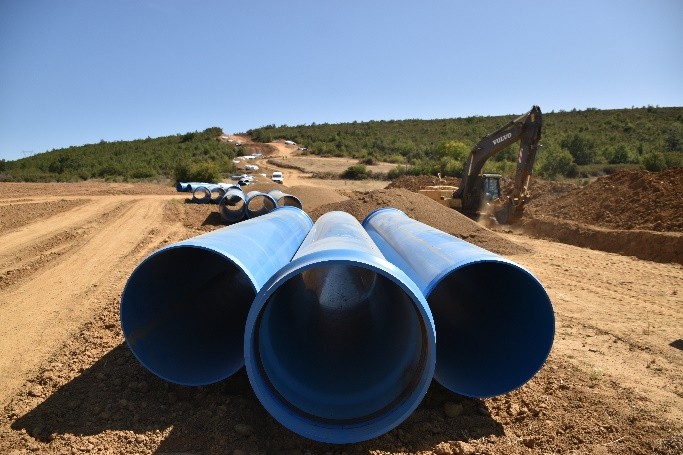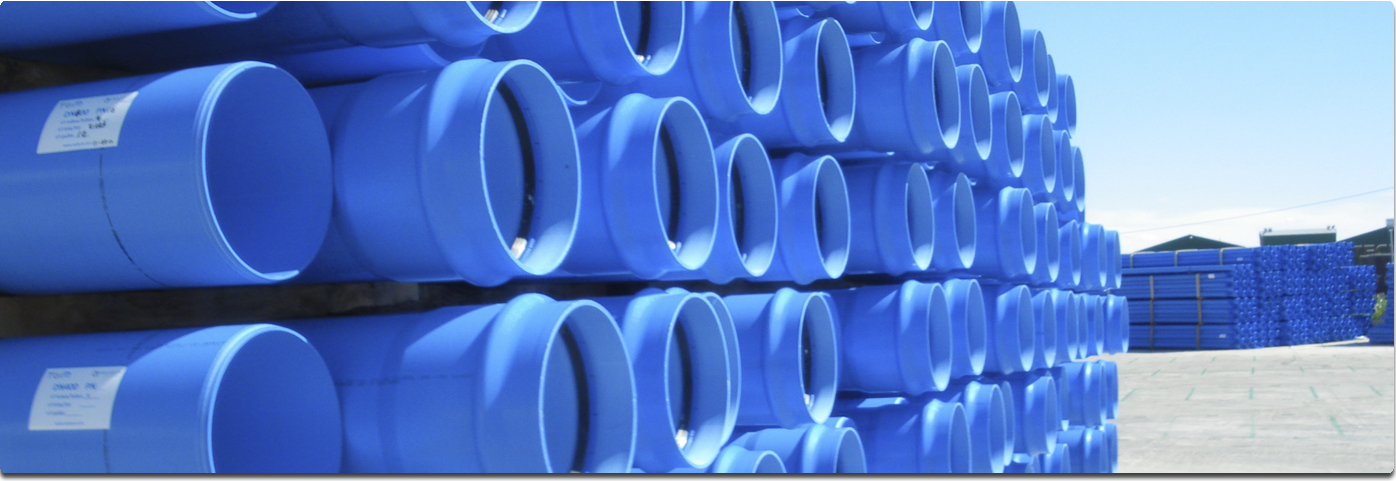New Agriculture Reinvents its Irrigation Systems with Pressurised Piped Networks
The agriculture sector is in one of its most difficult times, with scarce resources and increasing demand requiring a reinvention that produces more with less while reducing its ecological footprint and combating the effects of climate change. Ditch and open canal systems have become obsolete and need to be replaced by more modern and efficient water management systems that make the most of every drop of water.

A global revolution in agriculture is expected to take place in the coming years, designing smart irrigation systems where the use of new technologies, renewable energies and life cycle analysis of the product used will play a key role.
Among the structures required for this transformation are pressurised pipe networks. There are many possibilities for creating these water supply systems, but among all of them, plastic solutions stand out for their qualities and are considered key to achieving the modernisation plan for agriculture. Within the wide catalogue of materials, oriented PVC combines the ideal characteristics for the needs of the countryside and therefore products such as TOM® pipes and ecoFITTOM® fittings developed by Molecor are the ideal solution for the reinvention of irrigation.
The benefits of PVC-O in agriculture
The unique Molecular Orientation process, which is used in the manufacture of Molecor’s TOM® pipes and ecoFITTOM® fittings, improves the physical and mechanical properties of PVC and gives it exceptional characteristics, without altering the advantages and chemical properties of the original polymer. The molecular structure of the polymer is ordered and creates a laminated material with unsurpassed tensile and fatigue strength, ductility and impact resistance. Applying these characteristics to pressure pipes results in a high-strength tube with a very high useful life of over 100 years, considerable energy efficiency and a reduced environmental footprint both in the manufacture and in the subsequent use of the product.
In addition to the benefits of PVC-O, there are a series of characteristics that facilitate the creation of piping networks for supplying the countryside. The light weight of the oriented polymer compared to other materials speeds up the installation and facilitates the handling of the product, for example, for TOM® pipes of up to 315mm nominal diameter, heavy machinery is not necessary, they can be transported and installed manually. And their elastomeric jointing system allows for an immediate and completely watertight connection.
In addition, the strength and ductility of Molecor pipes and fittings considerably reduce the risk of bursting or cracking during installation, and their immunity to corrosion prevents the soil or transported water from deteriorating the structure of the pipeline network. This results in a structure capable of resisting the inclemency of meteorological phenomena amplified by the effects of global warming such as droughts or floods.
An example is worth more than a thousand words, the growth of almond trees in Georgia
In the development of new crop fields, the use of pressurised piping systems to supply the necessary water is becoming increasingly popular. An example of this is the creation of more than 500 hectares of almond orchards in the Kakheti region of Georgia. For this project, which started at the beginning of 2023, more than 25,000 metres of TOM® oriented PVC pipes are being installed to supply a total of more than 115,000 trees.

The required water is sourced from the Iori River and an artificial reservoir with a capacity of 130,000m3 which, thanks to two pumping stations and a pressurized pipeline network made of PVC-O TOM® pipes with nominal diameters ranging from 90mm to 630mm, is able to reach the orchards without any loss or leakage along the way.
Some of the characteristics that tipped the balance towards the use of oriented PVC in the creation of the supply network were a complicated orography that required a very resistant product and the ease of installation, which has speeded up the completion of the project. For these and other reasons, more and more projects all over the world are opting to use Molecor PVC-O pipes and fittings for their pressurised water pipelines.
Climate change, the greatest threat to the preservation of agriculture
It is clear that in today’s society there is great concern for the sustainability of the planet, climate change is already a reality and therefore the management and use of water is something that must be taken care of so that water resources can be maintained or even increased (a very complex challenge) in the coming years and decades. This is where the concept of “Sustainable Irrigation” comes into play.

Sustainable irrigation is key to facing the challenges of climate change in agriculture and being able to maintain a food production model in the future that responds to the population’s demand. And part of this commitment involves the use of products with a lower carbon footprint in farm management.
Contrary to the demonization to which they are subjected in society, plastic materials have been considered as one of the priority and strategic products in achieving the objectives of this commitment.
Molecor, as part of the plastics industry value chain, shows its commitment to the environment by offering the market more sustainable products throughout their life cycle and incorporating the principles of the circular economy and the use of renewable energy in their manufacture.
In addition, there are several characteristics of PVC that make it a more sustainable plastic material than other alternatives. It is less dependent on petroleum than other polymers (only 43% of its composition, the rest comes from common salt), it has a very long-life span, it is 100% recyclable and depending on its function it is not necessary to use heavy metals as stabilizers.
Together we can achieve a better future for the agricultural sector
In recent years, major investments have been made in the modernisation of irrigation systems. In most cases, these actions have consisted of replacing the open-air canal and irrigation ditch systems with pressurised pipe networks. The aim is to achieve better management of water resources, which are becoming increasingly scarce, as well as more sustainable, profitable and forward-looking production in an increasingly competitive market.
The fundamental objective to guarantee the viability of the future of the rural environment is to commit to new technologies, digitalisation and innovation as fundamental elements to develop new solutions that optimize production, reduce the consumption of resources and reduce their footprint on the ecosystem.
The agriculture sector is facing problems such as climate change and infrastructure renovation, and Molecor provides very favourable solutions to make irrigation modernisation possible. The TOM® pipes and ecoFITTOM® fittings in Oriented PVC (PVC-O) are one of the best alternatives on the market for irrigation works in pressurised water channeling, with the aim of intelligently managing water resources.
They are more efficient, sustainable products with a longer useful life cycle for pressurized water conduction that have important environmental and installation advantages, as well as better technical performance, high profitability and cost efficiency.

